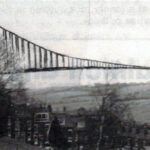27 September 1835: Gabriel Davis, an (Ashkenazi) Jewish optician of Woodhouse, asks a court to add him to the Leeds electoral roll
Leeds Mercury. 1835/10/03. Revising Barristers’ Court. Leeds. Get it:
.Unedited excerpt
If an excerpt is used in the book, it will be shorter, edited and, where applicable, translated.
Mr. Gabriel Davis, optician, Mount Preston. This was a case which stood over from Saturday, when he was excused for not appearing upon the peremptory call for the Lower North Division, on the ground that it was his Sabbath, Mr. Davis being of the Jewish religion.
The REVISING BARRISTER said he did not require his personal attendance, and his case might be proved in the same manner as any other case.
Mr. Davis said, he wished to be examined himself. Being of the Jewish religion, a messenger was sent to fetch an old testament, who shortly returned with a copy of the new testament, bearing some marks of antiquity, a mistake which excited some degree of merriment. Mr. Davis said, he thought it a serious matter to take an oath, and he requested to know the grounds on which an oath was required from him: he said he would speak the truth, but he had rather not be sworn.
Mr. Dibb said, if the Court had no objection, he was willing to receive his evidence without an oath.
Mr. Davis said, he supposed that he should be objected to as an alien, but he thought that having resided 25 years in England, he ought to be considered as a citizen, and he stated that Mr. Canning’s Act put him in the situation of a natural born subject. Mr. Davis stated that he was born in Germany; he could not say whether his parents, who died when he was very young, were English subjects or not; but he understood that his father was frequently in England, where he had some connexions; he had brothers who had resided 50 years in England.
Mr. WAILES spoke to a conversation with Mr. Davis, in which he stated that he was a German Jew.
Mr. RICHARDSON said that term by no means implied that he was of German parentage, but had reference solely to a sect among the Jews as German Lutherans among Christians: he understood that German Jews differed much in their religious faith from the Portuguese faith.
The REVISING BARRISTER said he would look into the Act referred to, and take into consideration the facts which had been proved, and give his judgment at a future period.
Comment
Comment
What was “Mr. Canning’s Act”?
Here’s the 1837 poll book entry for him (Perring 1837).
Something to say? Get in touch
Similar
 15 October 1838: Apologies from “imprisoned” Huddersfield workers are read to the great Chartist rally on Peep Green (Hartshead Moor), accusing middle-class radicals of betrayal
15 October 1838: Apologies from “imprisoned” Huddersfield workers are read to the great Chartist rally on Peep Green (Hartshead Moor), accusing middle-class radicals of betrayal 9 December 1932: The Jewish Chronicle mulls the Yorkshire Fascist Table Tennis Club’s decision to leave the Leeds league
9 December 1932: The Jewish Chronicle mulls the Yorkshire Fascist Table Tennis Club’s decision to leave the Leeds league Reproduction through the blind benevolence of Leeds Other Paper (RIP).1 April 1979: Amid motorway mania in Leeds, West Yorkshire Council is today to reveal plans to link Chapeltown and Woodhouse by a ¼-mile suspension bridge across Meanwood Beck
Reproduction through the blind benevolence of Leeds Other Paper (RIP).1 April 1979: Amid motorway mania in Leeds, West Yorkshire Council is today to reveal plans to link Chapeltown and Woodhouse by a ¼-mile suspension bridge across Meanwood Beck
Comment
Comment
Via Remember LOP, a feed by Tony Harcup which pays tribute to some splendid local journalism, unimaginable today.
Council sources claim the scheme was a victim of the first wave of cuts imposed by Margaret Thatcher following her General Election victory a month later.
Something to say? Get in touch
Search
Donate
Music & books
Place-People-Play: Childcare (and the Kazookestra) on the Headingley/Weetwood borders next to Meanwood Park.
Music from and about Yorkshire by Leeds's Singing Organ-Grinder.



 Bluesky
Bluesky Extwitter
Extwitter